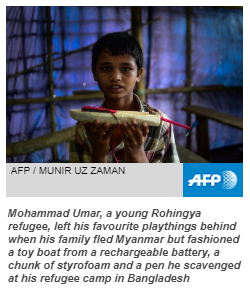 The Rohingya had no time to consider what to take as
Myanmar forces drove the Muslim minority into Bangladesh in a crackdown a year
ago likened by the UN to ethnic cleansing.
The Rohingya had no time to consider what to take as
Myanmar forces drove the Muslim minority into Bangladesh in a crackdown a year
ago likened by the UN to ethnic cleansing.
Some fled with little more than the clothes on their
backs and children on their hips. But what they did manage to bring tells an
intimate story about the plight of a long persecuted and stateless people.
- 'This isn't immaterial' –
Jalal Ahmed prized the faded tin number plate marked with
Burmese characters off the front of his family's home as they packed up their
lives and left Rakhine state.
"When we were leaving, we knew we would need
something to prove we were Rohingya, and proof of our residency," he told
AFP in the doorway of the shanty where he lives with his family in a vast
refugee camp in southern Bangladesh.
The Ahmed family had lived in a proud two-storey wooden
home in their village for countless generations, Jalal's grandfather Abdul
said.
Jalal, a 52-year-old businessman, said the plate was not
a memento but a connection to his past before the misery of refugee life.
"This isn't immaterial," Jalal said. "We
carried it with us because wherever we go, this will show that we belong to a
place."
- Our identity -
Mohammad Ayaz, 12, brought a faded old photograph of his
family with him on the long journey from Myanmar.
 It shows 17 people -- his grandparents, siblings and
parents, aunts and uncles -- posing for an official portrait holding signs
marked with Burmese script.
It shows 17 people -- his grandparents, siblings and
parents, aunts and uncles -- posing for an official portrait holding signs
marked with Burmese script.
The Rohingya are reviled in Myanmar as illegal
immigrants, branded "Bengalis" and denied citizenship and basic
rights and freedoms.
"We will need this photo when we go back to Myanmar,
to identify who is who from our family," he told AFP, folding up the
creased photograph for safekeeping.
"It's a very important picture. We will need
this."
- Feeding the needy -
Asaru Begum knew the journey to Bangladesh would be long
and arduous, especially for her children and grandchildren.
 So she brought cooking pots to gather water, stew rice
and green chillies, and perform ablutions for prayer while hiding out in the
hills.
So she brought cooking pots to gather water, stew rice
and green chillies, and perform ablutions for prayer while hiding out in the
hills.
"I brought the pots and rice because I knew the
children would get hungry after two days' journey," she told AFP, pointing
to the pots she still treasures today.
"I brought them so I could feed the babies. They cry
a lot when they are hungry."
- 'I miss school' -
Mohammad Khares, a diligent pupil with dreams of going to
university, was in his final year of high school when violence erupted in his
village.
 "I miss school very much. I was about to graduate, I
was this close. That really hurts," the crestfallen 20-year-old told AFP.
"I miss school very much. I was about to graduate, I
was this close. That really hurts," the crestfallen 20-year-old told AFP.
There are no schools in the camps, so Khares has used his
Bengali and English language skills to find piecemeal work with foreign aid
groups helping the refugees.
His school ID card is precious.
Most Rohingya receive little or no schooling in Myanmar
so his card -– bearing his photograph, credentials and official seal -– is a
rare privilege and a passport to opportunity.
"When I go back to Myanmar, I want to resume my
studies. But they might ask, 'what proof do you have of your education?' This
card will prove that I was a Class 10 (final year) student," he said.
- Family first -
Violence descended so quickly on Mohammad Jubayer's
village that he had no time to choose what his family might need to survive in
Bangladesh.
"On our way here, we couldn't bring anything,"
he told AFP at the edge of a fetid tent colony overlooking a trash-strewn,
muddy clearing.
Other escapees shared what food they could as Jubayer,
30, and his wife took turns carrying their four infant children as their eldest
daughter trailed behind.
"We spent nine days walking through the hills. We
had our children with us. So we just carried them -– nothing else."
- A touch of home -
 Mohammad Umar left all this favourite playthings behind
in Myanmar as his family joined the steady exodus of Rohingya leaving their
burning homeland.
Mohammad Umar left all this favourite playthings behind
in Myanmar as his family joined the steady exodus of Rohingya leaving their
burning homeland.
But once in Bangladesh, the industrious 12-year-old put
his mind to work.
Scavenging a rechargeable battery, and carving a hull
from a chunk of styrofoam, he fashioned a rudimentary boat replete with a pen
tube for a rudder.
"We used to make these and play with them in
Myanmar," Umar said as the boat chugged through brown puddles swollen by
monsoon rain.
Source: AFP


